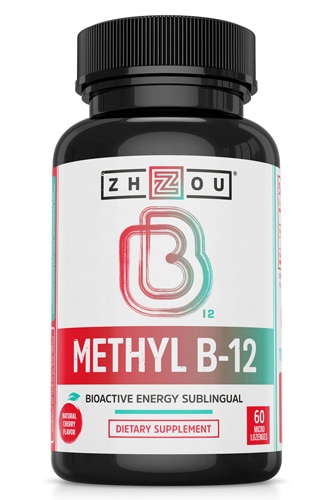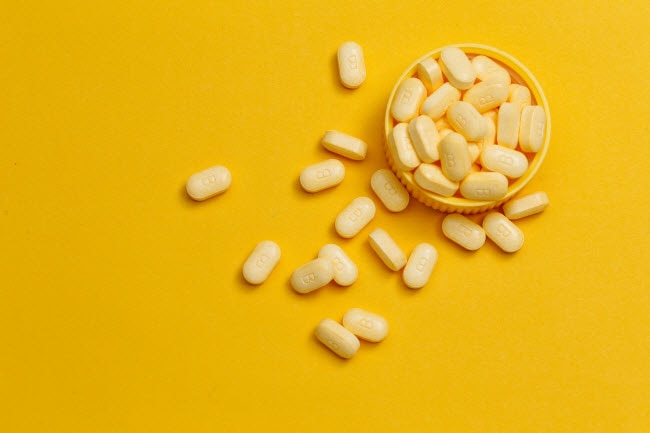In the realm of vitamins, there are orders of magnitude. For example, B12 has been one of those vitamins relegated to singing harmonies when in fact it should be center stage. But as people become more health- and planet-conscious—and vegetarianism and its positive environmental impact moves from fringe to mainstream—vitamin B12 has morphed from afterthought to nearly indispensable. Perhaps this is because of its aspirational moniker, the “energy” vitamin. Sure enough, B12 is the powerhouse behind DNA, the genetic material in all cells. It also keeps the body’s nerve, blood and brain cells healthy.
You can get B12 from food, but it’s found mainly in animal foods such as eggs, meat, shellfish and dairy, although some food products are fortified with B12. Burnt out celebrities along with mere mortals line up at doctor’s offices for monthly vitamin B12 shots and IV drips, purported to boost energy, make your skin glow, and even help promote weight loss.†
One of the reasons for B12’s newfound popularity is our gradual cultural tipping point to a plant-based diet. Remember author, journalist, and activist Michael Pollan’s seminal “Eat food. Not too much. Mostly Plants?” With it a new diet paradigm was born, along with scores of meat abstainers now much more at risk for B12 deficiency. And while many people are vitamin-skeptics, believing you can get all the nutrients you need from food, B12 isn’t quite like other vitamins. It’s found in a very narrow array of foods. So if you happen to be a vegetarian, or a vegan, it’s a safe bet you are not getting enough B12 unless you supplement. Other populations at risk of not getting enough B12 have celiac disease or other digestion problems or are adults over 50. Up to 15 percent of people don't get enough B12, and that risk of deficiency increases with age: Two thirds of those with B12 deficiency are over age 40.
Here’s everything you need to know about B12 and how to prevent—and cure—its depletion.
What is B12?
Part of the B vitamin family, vitamin B12, also known as cobalamin, is an essential vitamin that your body needs but cannot produce. It’s responsible for myriad metabolic processes and proper cell function.
What are the science-based benefits of B12?
Ensures healthy red blood cells
Helps with red blood cells formation, essential for warding off anemia.†
Bolsters frail bones
Studies suggest B12 exerts a protective effect on bone density and strength.†
Mitigates mood issues
Studies support the use of vitamin B12 supplements for improving mood in people deficient in this vitamin.† However, the role of B vitamins here isn't conclusive and more research is needed.
Boosts energy
Although B12 plays a key role in your body’s energy reserves, it’s not a magic energy bullet for those who have sufficient B12 levels. But if you’re significantly deficient in vitamin B12, taking a supplement or increasing your intake will likely improve your energy level.†
Supports brain health
Studies link a lack of B12 with memory loss, particularly amongst the aging population. The vitamin may play a role in brain health and cognitive function.†
Fosters healthy hair, skin and nails
Given that B12 is critical for cell production, it makes sense that its purview extends to hair, nails, and skin. Again, supplementation has the biggest impact on people who have low levels of B12. In people with B12 deficiency, supplementing with vitamin B12 has been shown to improve dermatologic symptoms.†
Am I getting enough vitamin B12?
There’s two major ways you can become susceptible to B12 deficiency. Either you don’t get adequate amounts from your diet or your body is unable to fully absorb it from the food you eat. Most people in the United States get enough vitamin B12 from the foods they eat, but some people don’t eat B12-rich foods or can’t absorb the B12. If you suspect you might be deficient, your doctor can test your vitamin B12 level.
Conditions susceptible to being B12 deficient:
- People over 50
- Atrophic gastritis, the lack of sufficient stomach acid to release B12 into small intestine
- Pernicious anemia, which makes it hard for your body to absorb vitamin B12
- Digestive disorders such as Crohn’s disease, celiac disease, bacterial growth, or a parasite
- Immune system disorders, such as Graves’ disease or lupus
- If you suffer from heartburn and take certain proton-pump inhibitors medications or take diabetes medicines such as metformin
- If you use alcohol excessively; smoke, as nicotine can also lower serum levels of vitamin B12; or take antibiotics
- Vegans and some vegetarians
Left untreated, a vitamin B-12 deficiency can lead to anemia, fatigue, muscle weakness, intestinal problems such as constipation, nerve damage and mood disturbances.
How much vitamin B12 do I need?
According to the National Institute of Health, the amount of vitamin B12 you need each day depends on your age. Average daily recommended amounts for different ages are listed below in micrograms (mcg):
| Life Stage | Recommended Amount |
| Birth to 6 months | 0.4 mcg |
| Infatns 7-12 months | 0.5 mcg |
| Children 1-3 years | 0.9 mcg |
| Children 4-8 years | 1.2 mcg |
| Children 9-13 years | 1.8 mcg |
| Teens 14-18 years | 2.4 mcg |
| Adults | 2.4 mcg |
| Pregnant teens and women | 2.6 mcg |
| Breastfeeding teens and women | 2.8 mcg |
What form of B 12 works best?
Vitamin B12 is found in almost all multivitamins. Dietary supplements that contain only vitamin B12, or vitamin B12 with nutrients such as folic acid and other B vitamins, are also available.
Sublingual (under the tongue) tablets and oral spray forms of vitamin B12, are often better for seniors who may have trouble absorbing this vitamin from the stomach because of the reduced amount of stomach acid. If you are truly deficient, a prescription form of vitamin B12 can be administered as a shot or nasal spray.
†These statements have not been approved by the Food and Drug Administration. These products are not intended to diagnose, treat, cure or prevent disease.




